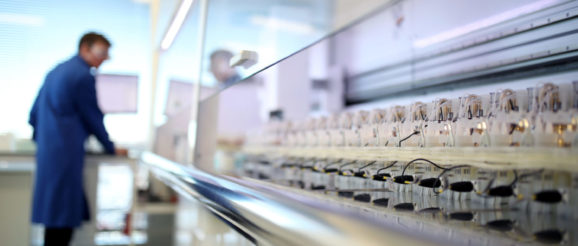U.K. Government-Backed Centre for Process Innovation (CPI) Scaling Up Imperial’s Coronavirus Vaccine

A self-amplifying mRNA-based (saRNA) candidate encodes a version of the coronavirus’ spike protein and is designed to induce muscle cells to produce the protein, which in turn stimulates an immune response.
The saRNA holds all the information needed to make the spike protein, but is short-lived and degrades after a few weeks, according to Ryan O’Hare, Imperial College London (ICL) spokesman, who added that the strands are packaged into tiny fat droplets to form the final vaccine.
“Once the vaccine is injected into muscle, the cells absorb the fat droplets and their contents,” he continued. “The saRNA then ‘amplifies’ itself, making more RNA copies. The muscle cells read these RNA instructions and produce lots of copies of the spike protein—but not the virus itself.”
The ICL team claims that vaccines made using this approach could be produced much faster than those made using conventional methods, explaining that they made the SARS-CoV-2 candidate in just 14 days. In animal studies, the vaccine induced neutralizing antibodies that protect against infection.1 Phase II clinical trials are due to begin in June, funded by a £22.5 million grant awarded by the U.K. Government in April.2
In May, ICL received £18.5 million from the U.K. Government to accelerate development of the vaccine.3
The Centre for Process Innovation, which provides manufacturing expertise and process development support to biopharmaceutical companies, is involved in the project.
A CPI spokeswoman, Sarah Williamson, said that “CPI, on behalf of the BioIndustry Association (BIA)-led vaccine manufacturing group, is leading the work stream to manufacture the Imperial College London mRNA vaccine candidate. This includes establishing the scaleup and development of the mRNA vaccine platform technology, which will ultimately allow for the manufacture of the millions of doses required as soon as the vaccine candidate passes clinical trials.”
The CPI operates the U.K. National Biologics Manufacturing Centre (NBMC) in Darlington in the North East of England.
Process development
Work at the facility will focus on process development with an eye on scaleup, according to Williamson.
“CPI will evaluate this in-house at NBMC establishing a process to effectively scale-up the manufacturing process of the vaccine,” she explained. “NBMC is staffed with a 50:50 mix of personnel from scientific and engineering backgrounds and will also be evaluating whether or not the facility could be upgraded to manufacture a vaccine for human use.”
